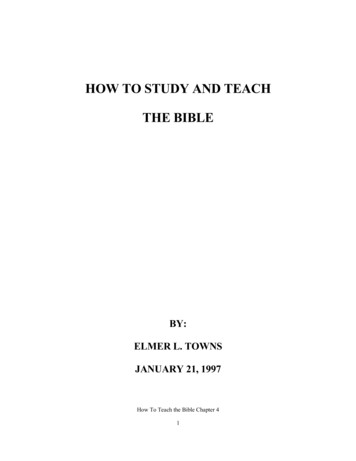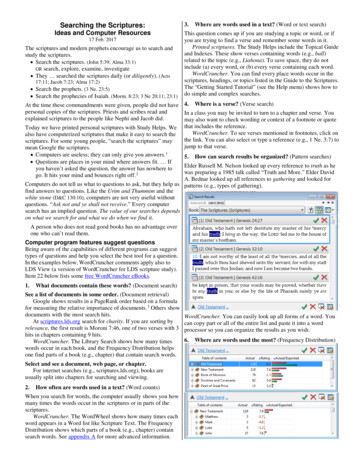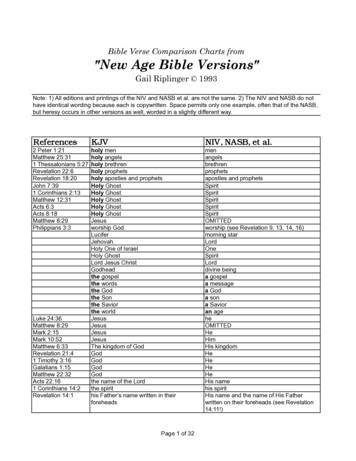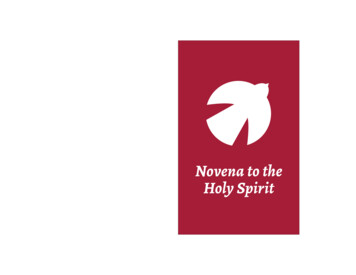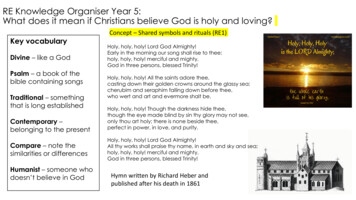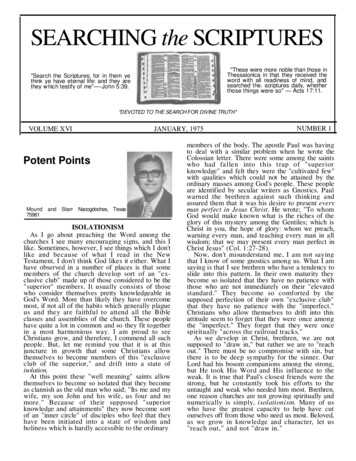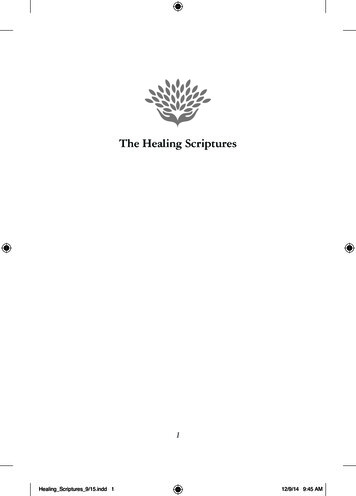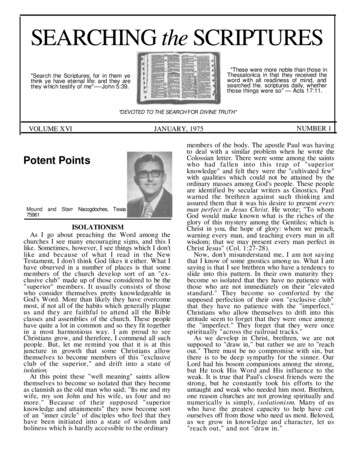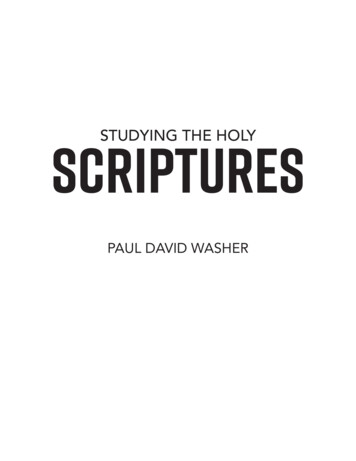
Transcription
STUDYING THE HOLYSCRIPTURESPAUL DAVID WASHER
“Dr. Martyn Lloyd-Jones once said, ‘The man whose doctrine is shakywill be shaky in his whole life.’ A believer without a solid doctrinalfoundation will be at the mercy of every wind of doctrine, and hisusefulness in the kingdom of God will be severely limited. Hence theenormous importance of this work. Paul Washer has written a simpledoctrinal compendium without being simplistic; it is deeply rooted inScripture and presented in a memorable way. It is the book thatI would like to put in the hands of every new believer in our church.”— Sugel Michelén, Pastor of Iglesia Bíblica del Señor Jesucristo, Author of From and Before God“The Psalmist asks: ‘How can a young man keep his way pure? Bykeeping it according to Your word.’ The study of the Scriptures isa vital requirement for spiritual health and growth. Paul Washerhas produced a clear, simple resource that, if followed, will helpestablish a young believer in his way. Especially do I appreciatePaul’s emphasis on doctrine’s essentiality to the Christian and togrowth in the Christian life. May God give this work much usefulness!”–– Samuel Waldron, President of Covenant Baptist Theological Seminary, Author of To Be Continued?“Secularists and pagans have always understood the importance ofindoctrination at the elementary stages of instruction; but biblicalChristians in our generation seem to be embarrassed by the notion, dueto its association with propaganda. It is essentially, however, the mastery of information before it is critically analyzed––like the time-testedefficacy of the catechism in the history of the Church. This is done inevery discipline at the basic levels, whether it is mathematics, language,science, or history. Why not the Holy Bible? The Church will lose thewar in the competition of ideas in our generation if serious efforts, likethis timely workbook, are not welcomed and utilized with discipline.”— Hensworth W. C. Jonas, Pastor, Executive Director of East Caribbean Baptist Mission
STUDYING THE HOLY SCRIPTURESCopyright 2021 Paul David WasherAll rights reserved. No part of this book may be used or reproduced in any manner whatsoever without written permission except in the case of brief quotations embodied incritical articles and reviews. Direct your requests to the publisher at the following address.Published by:HeartCry Missionary SocietyPO Box 3506Radford, VA 24143www.heartcrymissionary.comPrinted in the United States of America 2021ESV Edition 1AUnless otherwise noted, all Scripture quotations taken from theThe Holy Bible, English Standard Version (ESV )Copyright 2001 by Crossway, a publishing ministry of Good News Publishers.All rights reserved. ESV Text Edition: 2016.Pronouns referring to God have been capitalized for consistency.Edited by Meghan Nash, Mary Claire Castleberry, and Forrest HiteAdditional proofreading by Hunter GatelyLayout and design by Mary Claire Castleberry, Michael Reece, and Forrest Hite
STUDYINGTHE HOLYSCRIPTURESTable of ContentsIntroduction viiOptional Study Schedule ix1.2.3.4.5.Part One: An Introduction to Christian DoctrineChristian DoctrineThe Source of Christian DoctrineThe Importance of Christian Doctrine (Part One)The Importance of Christian Doctrine (Part Two)The Importance of Christian Doctrine (Part 22.23.24.Part Two: The Holy ScripturesAn Overview of Divine RevelationGeneral RevelationSpecial RevelationThe Trustworthiness of the BibleA Brief History of the BibleThe Purpose of the Bible (Part One)The Purpose of the Bible (Part Two)The Purpose of the Bible (Part Three)The Power of God’s Word (Part One)The Power of God’s Word (Part Two)The Power of God’s Word (Part Three)A Proper Attitude Toward God’s Word (Part One)A Proper Attitude Toward God’s Word (Part Two)The Holy Spirit and the ScripturesPrayer and the ScripturesBenefiting from the Word (Part One)Benefiting from the Word (Part Two)Obeying the ScripturesInterpreting the ScripturesAppendix: Practical Helps for Reading and Studying 119125131137141v
STUDYING THE HOLY SCRIPTURESvi
STUDYINGTHE HOLYIntroductionSCRIPTURESMETHOD OF STUDYThe great goal of this study is for the student to have an encounter with God through HisWord. Founded upon the conviction that the Scriptures are the inspired and infallible Word ofGod, this study has been designed in such a way that it is literally impossible for the studentto advance without an open Bible before him or her. The goal is to help the reader obey theexhortation of the Apostle Paul in II Timothy 2:15:Do your best to present yourself to God as one approved, a workerwho has no need to be ashamed, rightly handling the word of truth.Each chapter deals with a specific aspect of Christian doctrine, divine revelation, or God’sWord––the Bible. The student will complete each chapter by answering the questions and followingthe instructions according to the Scriptures given. The student is encouraged to meditate uponeach text and write his or her thoughts. The benefit gained from this study will depend upon thestudent’s investment. If the student answers the questions thoughtlessly, merely copying the textwithout seeking to understand its meaning, this book will be of very little help.Studying the Holy Scriptures is primarily a biblical study and does not contain much in the wayof colorful illustrations, quaint stories, or theological treatises. It was the desire of the author toprovide a work that simply points the way to the Scriptures and allows the Word of God to speakfor itself.This workbook may be used by an individual, in a small group, for a Sunday school class, or inother contexts. It is highly recommended that the student complete each chapter on his or herown before meeting for discussion and questions with a group or discipleship leader.EXHORTATION TO THE STUDENTThe student is encouraged to study biblical doctrine and discover its exalted place in theChristian life. The true Christian cannot bear or even survive a divorce between the emotions andthe intellect or between devotion to God and the doctrine of God. According to the Scriptures,neither our emotions nor our experiences provide an adequate foundation for the Christian life.Only the truths of Scripture, understood with the mind and communicated through doctrine, canprovide that sure foundation upon which we should establish our beliefs and our behavior anddetermine the validity of our emotions and experiences. The mind is not the enemy of the heart,and doctrine is not an obstacle to devotion. The two are indispensable and should be inseparable.The Scriptures command us to love the Lord our God with all our heart, with all our soul, and withall our mind (Matthew 22:37) and to worship God both in spirit and in truth (John 4:24).The study of doctrine is both an intellectual and devotional discipline. It is a passionate searchfor God that should always lead the student to greater personal transformation, obedience, andheartfelt worship. Therefore, the student should be on guard against the great error of seekingonly impersonal knowledge instead of the person of God. Neither mindless devotion nor mereintellectual pursuits are profitable, for in either case, God is lost.vii
STUDYING THE HOLY SCRIPTURESTHE ENGLISH STANDARD VERSION BIBLEThe English Standard Version Bible is required to complete this study. This version of Scripturewas chosen for the following reasons: (1) the unwavering conviction of its translators that theBible is the infallible Word of God; and (2) its faithfulness to the original languages.A WORD FROM THE AUTHORThe Scriptures are the greatest treasure that a person can possess. They are the only sourceof inspired, inerrant, and infallible revelation regarding God, His will, and His works––especiallyHis work of redemption through Jesus Christ. The Christian cannot hold too high a view of theBible or exalt it beyond what it deserves. For these reasons and many others, the Christian shouldconsider the study of the Scriptures to be his or her primary and lifelong task. This workbook wasdesigned and written with these things in mind. As the student works through the material, he orshe will discover why and how the Scriptures should be studied and obeyed.I would like to thank my wife Charo for her constant support and my four children (Ian, Evan,Rowan, and Bronwyn), who continue to be a great delight. I would also like to thank HeartCry staffmember Forrest Hite for his diligent and meticulous editing of the several different manuscriptsthat he has received. His contributions to the arrangement and overall readability of this work areas significant as they are appreciated. My thanks also are extended to the entire staff at HeartCry,who have been a great encouragement throughout the process of this book’s publication.RECOMMENDED RESOURCES FOR FURTHER STUDIESProfiting from the Word by Arthur W. PinkThe Scripture Cannot Be Broken by John MacArthurThe Implications of Inerrancy for the Global Church by multiple authorsCan I Trust the Bible? by R. C. Sproul40 Questions About Interpreting the Bible by Robert L. PlummerScripture Alone by James R. WhiteThe Bible: God’s Inerrant Word by Derek W. H. ThomasThe Canon of Scripture by Samuel WaldronThe Canon of Scripture by F. F. BruceThe Question of Canon by Michael J. KrugerThe Inspiration and Authority of the Bible by Benjamin B. Warfield (for advanced students)The Doctrine of the Word of God by John M. Frame (for advanced students)ADDITIONAL NOTEYou may have noticed that this book is being sold at a strange price. Here’s why: one dollar ( )from every copy sold will go directly to fund mission work through HeartCry Missionary Society(heartcrymissionary.com). The rest of the sale price is just enough to cover the cost of printing, publication, and distribution. The author is not profiting from the sale of this book, nor has he profitedfrom the sale of any other book. Over the years, we have utilized and explored many avenues in order to publish these workbooks. Ultimately, we have reached the conclusion that doing so in-houseat a low cost, even with slightly lower quality, is the most effective way of getting these useful toolsinto the hands of as many people across the globe as possible. We hope and pray that the Lordcontinues to use these books to point His people to His Word unto the edification of His Church.viii
IntroductionOptional Study ScheduleWeek One: Christian Doctrine, Part 1Day 1: Chapter 1Day 2: Chapter 2Day 3: Chapter 3, Section 1Day 4: Chapter 3, Section 2Day 5: Read Psalm 119:1-88Week Two: Christian Doctrine, Part 2Day 1: Chapter 4, Section 1Day 2: Chapter 4, Section 2Day 3: Chapter 5, Section 1Day 4: Chapter 5, Section 2Day 5: Read Psalm 119:89-176Week Three: Divine Revelation and the Trustworthiness of the BibleDay 1: Chapter 6Day 2: Chapter 7, Section 1, Subsections 1-2Day 3: Chapter 7, Section 1, Subsections 3-4Chapter 7, Section 2Day 4: Chapter 8Day 5: Chapter 9Week Four: The History and Purpose of the BibleDay 1: Chapter 10Day 2: Chapter 11Day 3: Chapter 12, Sections 1-2Day 4: Chapter 12, Sections 3-4Chapter 13, Section 1Day 5: Chapter 13, Section 2Week Five: The Power of God’s WordDay 1: Chapter 14Day 2: Chapter 15, Section 1Day 3: Chapter 15, Section 2Day 4: Chapter 16, Section 1Day 5: Chapter 16, Section 2Week Six: The Believer’s Response to the Scriptures, Part 1Day 1: Chapter 17, Section 1Day 2: Chapter 17, Section 2Day 3: Chapter 18Day 4: Chapter 19Day 5: Chapter 20ix
STUDYING THE HOLY SCRIPTURESWeek Seven: The Believer’s Response to the Scriptures, Part 2Day 1: Chapter 21Day 2: Chapter 22, Section 1Day 3: Chapter 22, Section 2Chapter 23, Main Points 1-4Day 4: Chapter 23, Main Points 5-8Day 5: Chapter 24Appendixx
PA R T O NEAN INTRODUCTIONTO CHRISTIAN DOCTRINE
STUDYINGTHE HOLYSCRIPTURESChapter 1: Christian DoctrineIn this chapter, we will define the term “Christian doctrine” and consider its great importancein the life of every believer.CHRISTIAN DOCTRINE DEFINEDMany Christians are intimidated by the term “doctrine.” They believe that the subject is toohigh or difficult for the common Christian and should be reserved for the professional theologianor scholar. In this study, we will learn that this attitude toward doctrine is unbiblical and unhealthy.Christian doctrine can and should be studied and understood by all. To begin our journey intothis marvelous theme, we will learn concise definitions of the terms “doctrine” and “Christiandoctrine.”Doctrine: The word literally means, “teaching.” In the Old Testament, the word isderived from the Hebrew word lekah, which means, “what is received” (Deuteronomy 32:2; Job 11:4; Proverbs 4:2; Isaiah 29:24). In the New Testament, the wordis derived from the Greek word didaskalía, which refers to “the act of teaching”(I Timothy 4:13, 16; 5:17; II Timothy 3:10, 16) or “what is taught” (Matthew 15:9;II Timothy 4:3).Christian Doctrine: The beliefs that are held, practiced, and taught by Christiansand are formed from a systematic study of the Old and New Testament Scriptures.Christian doctrine is simply the teachings of the Bible that we as Christians believe, practice, and teach to others. If you have studied the Bible, then you have studied doctrine. If at onetime you have shared what you have learned with others, then you have taught doctrine. Therefore, in one way or another, every Christian is a theologian!1. According to the above teaching, how is “Christian doctrine” defined? Fill in the blanks.a. The B that are H , P ,and T by Christians and are F from aS study of the O and N Testament Scriptures.2. Based on the truths we have considered, write a definition of “Christian doctrine” in yourown words.3
STUDYING THE HOLY SCRIPTURES3. Based on the truths we have considered, is the study of doctrine only for professionaltheologians, or is it for all Christians? Explain your answer.THE MAJOR THEMES OF CHRISTIAN DOCTRINEThe word “doctrine” encompasses everything that the Bible teaches. For this reason, itis helpful to organize biblical doctrine into different categories. In this section of our study,we will follow the classical outline, organizing the great doctrines of the Bible into sixteendifferent categories.Bibliology (Greek: biblía books logía study or discourse): The study ofthe Bible. It encompasses divine revelation, the formation of the Scriptures, andthe Bible’s authority and use in the Christian life. It may also include hermeneutics (Greek: hermēneúō to interpret), which is the study of the principles ofBible interpretation.Theology (Greek: theós God logía study or discourse): The study of God.It encompasses the nature, attributes, and works of God. The term is also used inreference to the study of all doctrine.Christology (Greek: Christós Christ logía study or discourse): The study ofChrist. It encompasses Christ’s nature and works, especially His life, death, resurrection, and glorification.4
Christian DoctrinePneumatology (Greek: pneúma spirit logía study or discourse): The studyof the Holy Spirit. It encompasses His nature and works, especially with regard toconversion and the Christian life.Angelology (Greek: ággelos or ángelos angel logía study or discourse):The study of angels. It encompasses the nature and ministry of angels as servantsof God.Demonology (Greek: dáimōn demon logía study or discourse): The studyof demons. It encompasses the nature, works, and final judgment of Satanand demons.Anthropology (Greek: ánthrōpos man logía study or discourse): The study ofman. It encompasses the creation, fall, nature, and need of man.Soteriology (Greek: sōtêrion salvation logía study or discourse): The studyof salvation. It encompasses the cross and resurrection of Christ; the sovereigntyof God and man’s responsibility; repentance, faith, and works; and the justification,assurance, sanctification, and final glorification of the believer.Ecclesiology (Greek: ekklēsía church logía study or discourse): The study ofthe Church. It encompasses the Church’s foundation, purpose, organization, ordinances, and responsibilities.Eschatology (Greek: éschatos last [things] logía study or discourse): Thestudy of the last days. It encompasses death, heaven and hell, the second comingof Christ, and the final destiny of creation.Ethics (Greek: ēthikós from êthos custom, moral habit): The study of moral values. It addresses the proper worldview and behavior of the Christian with respectto human life and morality.Devotional Life: The study of the devotional disciplines as they are set forth inthe Scriptures and practiced throughout the history of the Church. It encompassessuch disciplines as the study of Scripture, prayer, fasting, confession, meditation,and worship.Christian Ministry: The study of spiritual gifts and the various ministries in the localchurch, with a special emphasis given to pastoral ministry and proclamation.Evangelism (Greek: euaggélion or euangélion good news): The study of the specific content of the gospel and how to communicate it biblically to others.Missiology (Latin: missio to send, send out Greek: logía study or discourse):The study of the missionary work of the Church. It encompasses the Great Commission, the individual missionary call, the spiritual needs of the world, and the biblicalmethodology of missions.Counseling: The study of biblical counseling with a view to the spiritual, intellectual,and emotional needs of individuals.5
STUDYING THE HOLY SCRIPTURES1. Review the major themes of doctrine in the previous two pages until you have committedthem to memory. Then match each term with its proper definition.6Bibliologya. The study of the person and work of the Holy Spirit.Theologyb. The study of the use of Scripture for counseling.Christologyc. The study of God’s work of salvation.Pneumatologyd. The study of the purpose, organization, and ordinances ofthe Church.Angelologye. The study of the content of the gospel and how tocommunicate it biblically to others.Demonologyf. The study of moral values as set forth in the Scriptures.Anthropologyg. The study of the formation, authority, and use of theScriptures.Soteriologyh. The study of the devotional disciplines as set forth in theScriptures and practiced in Church history.Ecclesiologyi. The study of the creation, fall, nature, and need of man.Eschatologyj. The study of the nature, works, and final destiny of Satanand demons.Ethicsk. The study of the Great Commission and the missionarywork of the Church.Devotional Lifel. The study of the person and work of Jesus Christ.Christian Ministrym. The study of the nature and ministry of angels.Evangelismn. The study of ministry in the local church with a specialemphasis on pastoring and proclamation.Missiologyo. The study of the nature, attributes, and works of God.Counselingp. The study of the last days, the second coming of Christ, andthe final destiny of creation.
STUDYINGTHE HOLYSCRIPTURESChapter 2: The Source ofChristian DoctrineFor our doctrine to be correct, it must be derived from an authoritative source—one thatspeaks without error regarding God, His works, and His plan for us. In the entire world, there isonly one source of divine knowledge with such credentials—the Bible. One of the most crucialtruths that we will learn in this study is that the Bible is the only absolute authority for our beliefs,practices, and teaching. All of our doctrine must be derived from the Holy Scriptures.1. Based upon the teaching of the Apostle Paul in II Timothy 3:16, explain why the Bible is theonly worthy and authoritative source of Christian doctrine.NOTES: The words “breathed out” comes from the Greek word theópneustos, which maybe literally translated, “God-breathed.” The fact that the Bible is the inspired and infallibleWord of God carries great meaning for the Christian. Its teaching is absolutely trustworthy,its promises are always faithful, and its commands and principles are the very wisdom ofGod. The wise can establish their doctrine and build their lives upon the Scriptures.2. The Bible is the only absolute authority for Christian doctrine. Nevertheless, many commit theerror of building their belief systems and practices upon unbiblical and untrustworthy sources.Identify these sources below according to their respective texts.Jeremiah 17:9a. Religious or mystical experiences (angelic messages,visions, etc.).Proverbs 14:12b. The human heart.Matthew 15:6-9c. The philosophies of the world.Colossians 2:8d. The ways, thoughts, and opinions of men.Colossians 2:18e. The traditions and commandments of men.7
STUDYING THE HOLY SCRIPTURESNOTES: It is of greatest importance that we hold to the conviction that the Bible isthe only absolute authority from which to derive our doctrines, beliefs, and practices.The human heart is deceitful, the intellect can be mistaken, the traditions of men canbe contrary to Scripture, and religious experiences such as visions and dreams can bedeceptive. An excellent rule to follow is to compare everything that we think, feel, see,and hear to the Word of God. That which does not agree with the Scriptures should berejected.3. Knowing that the Bible is the only infallible source and authority for all Christian doctrine, howshould the Christian respond? What do the following texts from the Old and New Testamentsteach us?a. Joshua 1:8b. Psalm 119:105c. Matthew 4:48
The Source of Christian Doctrined. Matthew 7:24-27e. II Timothy 2:15f. Colossians 3:169
STUDYING THE HOLY SCRIPTURES4. Describe your relationship with the Bible. Does the Bible have an important place in your dailylife? Is the Bible the foundation of all your beliefs and practices? Is there a need for you tomake some changes in your priorities?10
STUDYINGTHE HOLYSCRIPTURESChapter 3: The Importance ofChristian DoctrinePart One: Doctrine and ChristianityThe great majority of Christians oftentimes neglect the study of Christian doctrine. The following excuses for this neglect are often heard:Objection 1: “The Christian needs Jesus, not doctrine.”Objection 2: “Christianity is a religion of the heart and not the intellect.”Objection 3: “Doctrine quenches Christian zeal.”Objection 4: “Doctrine is not practical and has little use in the Christian life.”Objection 5: “Doctrine causes division.”Objection 6: “Doctrine is too difficult for the common Christian.”Even though these objections are very popular within contemporary Christianity, they are unsound and demonstrate an ignorance of biblical Christianity and the will of God as it is revealed inthe Scriptures. In this chapter and the two that follow, we will refute these objections one-by-oneand demonstrate the vital importance of biblical doctrine in the Christian life.THE CHRISTIAN NEEDS JESUS AND DOCTRINEIn every way, Jesus is all we need for salvation. However, how can we recognize the real Jesuswithout any knowledge of biblical doctrine? The Bible teaches that there will be false Christs whowill attempt to deceive us, and we know that even many of the most recognizable cults claim tobelieve and preach Jesus. How can we be sure that we have believed in the true Christ if we havenot studied the Scriptures and formed a biblical doctrine of His person and works? Furthermore,how can we be sure that we are living according to His will if we have not studied His teachingsthat have been revealed to us through the Scriptures? We must recognize that doctrine is indispensable if we are to believe and live correctly before God and men.1. According to Matthew 7:28-29, what did the crowds admire?11
STUDYING THE HOLY SCRIPTURESNOTES: It is notable that the word “teaching” comes from the Greek word didachê, whichcan also be translated, “instruction” or “doctrine” (KJV). The Lord Jesus Christ was thebest of all teachers. He knew and understood the essentiality of doctrine and taught itfrequently to His disciples and the multitudes that gathered to hear His words. Humanity’sgreatest need is to know God and to understand His will. Jesus came to reveal God to menand to show them His will through the practice of His life and the words of His teaching.2. In Mark 4:24-25, what warning did Jesus give to His disciples regarding His teaching (doctrine)and their responsibility to value, comprehend, and persevere in it?NOTES: The phrase “pay attention” is translated from the Greek word blépō, which literally means, “look” or “take care” (NASB) or “take heed” (KJV). Jesus is warning us thatwe should pay close attention to His teaching (doctrine). If we embrace the importance ofbiblical doctrine, the Lord will teach us more about Himself and His will. If we neglect Histeaching, even the knowledge that we have gained will be lost. Lamentably, many Christians have not learned to appreciate the teachings of the Scriptures. We are often guilty oftreating the diamonds of God’s Word as though they are nothing more than pieces of coal!3. What does Acts 2:42 teach us about the Christians in the early Church and their attitudetoward doctrine?a. They D themselves to the apostles’ T .NOTES: Can you imagine a church more vibrant and filled with the Holy Spirit thanthe one described in Acts 2? In verse 41, we read that three thousand persons wereconverted and baptized in one day. What was the key to such a great move of God? Although there were many factors, we know that one of the most crucial was the sinceritywith which the Christians continually “devoted” themselves to the apostles’ teaching.It is notable once again that the word “teaching” comes from the Greek word didachê,which can also be translated, “instruction” or “doctrine” (KJV). Like the Lord JesusChrist (Matthew 7:28-29), the apostles recognized the need to teach doctrine. Thepeople had received pardon for their sins and the gift of the Holy Spirit (Acts 2:38), butthey still needed the teaching or doctrine of the apostles to live a life pleasing to Godand to be effective witnesses of the gospel.12
The Importance of Christian Doctrine4. According to Ephesians 4:14-15, what is another reason that Christians should be mature andinstructed in Christian doctrine?NOTES: There are more religious groups today than in any other time in the history ofChristianity. We often hear about a new sect or cult proclaiming doctrines that depart fromhistoric Christianity. Who has the truth? We can know only through an adequate comprehension of biblical doctrine. The resolution to every conflict or confusion begins with onequestion: “What does the Word of God have to say?”5. What exhortation does the Apostle Paul give to his young disciple Timothy in I Timothy 4:16?How does his admonition demonstrate the importance of doctrine?NOTES: The word “teaching” is derived from the Greek word didaskalía, which can alsobe translated, “instruction” or “doctrine” (KJV). How important is doctrine? In one way, itis accurate to say that our salvation depends upon it! Faith is not sufficient to save unless itis placed in something or someone that is worthy of it and that has the power to save us.Doctrine is important because it leads us to the true Savior, explains to us who He is, andteaches us what He requires of us.6. According to I Timothy 6:3, what are some key characteristics that will help us identify truebiblical doctrine?a. It will not be a D D from that which wastaught by the apostles. From the Greek word heterodidaskaléō (héteros different orother didáskō to teach).13
STUDYING THE HOLY SCRIPTURESb. It will agree with S words of our Lord Jesus Christ. From the Greekword hugiaínō, which refers to that which is healthy, in contrast to that which is sick orsickly. True biblical doctrine will lead to spiritual health.c. It will accord with G . From the Greek word eusébeia, whichrefers to piety, reverence, and devotion to God. True doctrine will always agree withand lead to true piety.CHRISTIANITY IS A RELIGIONOF THE HEART AND THE INTELLECTThe following declaration is commonly heard within contemporary Christianity: “Christianity isnot knowledge of doctrine or a textbook of biblical facts; it is a religion of the heart—a personalrelationship between God and His people.” Although this frequent description of the Christianfaith contains an element of truth, it also contains an element of error. While it is true that Christianity is a religion of the heart and that its highest expression is a personal relationship with God,it is equally true that Christianity is a religion of the intellect that is founded upon an accurateknowledge of biblical doctrine. In a biblical and vibrant Christianity, there is no divorce betweenthe emotions and the intellect or between experience and the absolute truths of Scripture. Theyboth have essential roles, and neither can be neglected without great harm to the believer andto the Church.1. “Follow your heart!” is a common mantra heard in the world and even in the Church. Howbiblical is this advice? According to Jeremiah 17:9, how trustworthy are the emotions andsentiments of the heart?2. The emotions of our heart can be completely mistaken, and they are subject to change likethe wind. The Christian who directs his life according to them will be unstable and unsurein everything he does. Do you believe that the heart, unguided by biblical doctrine, is atrustworthy guide for the Christian life? How does Proverbs 14:12 warn anyone who woulddare to guide his life by the emotions and sentiments of his heart?14
The Importance of Christian Doctrine3. The heart (i.e. emotions and sentiments) is a very important and beautiful part of the Christianlife,
9. The Trustworthiness of the Bible 48 10. A Brief History of the Bible 54 11. The Purpose of the Bible (Part One) 61 12. The Purpose of the Bible (Part Two) 67 13. The Purpose of the Bible (Part Three) 75 14. The Power of God's Word (Part One) 81 15. The Power of God's Word (Part Two) 85 16. The Power of God's Word (Part Three) 91 17.

